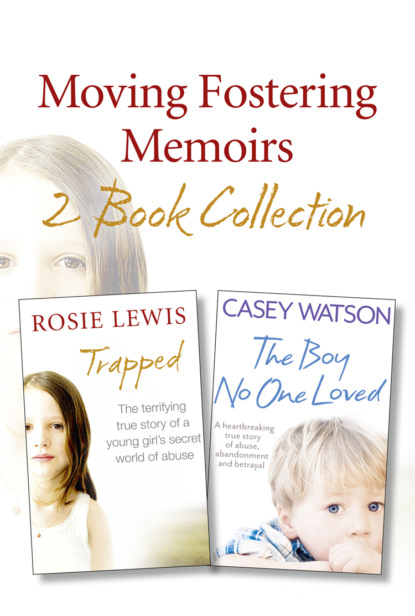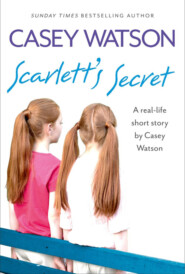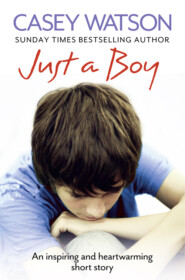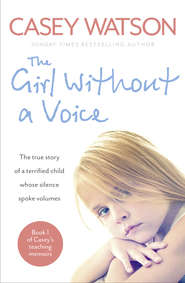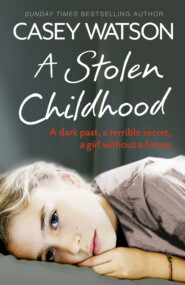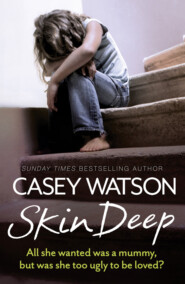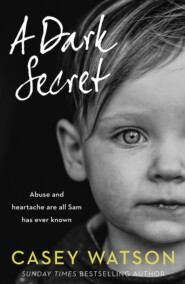По всем вопросам обращайтесь на: info@litportal.ru
(©) 2003-2025.
✖
Moving Fostering Memoirs 2-Book Collection
Настройки чтения
Размер шрифта
Высота строк
Поля
Story time with Phoebe was a whole different experience. Before I had finished one sentence she started repeating me so that by the end of the last page my head was throbbing and my patience running thin.
‘Again!’ she shouted, as I snapped the book shut. I was amazed she had enjoyed it but my nerves were by then so frayed that I couldn’t face another chapter.
‘Not tonight – bedtime now but we’ll read again in the morning if you’d like, as long as you don’t say anything unkind. If you do, I’ll stop reading straight away, OK?’
She looked at me quizzically but didn’t answer. Could she even remember saying she hated me? I told her to change into her pyjamas and left her to get undressed, hoping she would digest what I’d said. After a few moments I leaned my head around the door.
‘Goodnight, Phoebe.’
‘Goodnight, Phoebe.’
Emily and Jamie were on the sofa when I returned to the living room and flopped between them with a loud sigh. ‘Fancy a game of rummy?’ I asked. Jamie nodded, fishing out his pack of cards from the magazine rack. After a full day with Phoebe it was the last thing I wanted to do, but a bit of individual time with the children usually worked wonders, relieving the tension that flowed between us in the early days of a placement.
Jamie sat opposite, shuffling the cards.
‘She’s so weird,’ he said bluntly.
‘Shush, Jamie. Keep your voice down.’ I knew that children in care seemed to have an eerie bat-like ability to hear through walls, a response to being kept in the dark about so many issues concerning them. ‘We don’t want to hurt her feelings.’
He looked chastened, drawing invisible patterns on the joker at the top of the pack. ‘Sorry, but I don’t think she has any feelings. She’s not very nice – I thought she was supposed to be warm and friendly?’
‘Mmm, bit of a stretch of the imagination, I must admit. But maybe that’s because we don’t understand her yet.’ I looked at Emily. ‘What do you think, Em?’
My daughter gave me a sidelong glance. ‘What she did to my butterflies wasn’t too friendly,’ she jibed, grinning.
‘And chucking plates isn’t that warm,’ Jamie cut in, his eyes twinkling with humour.
I laughed out loud, throwing my arms around both of them and planting kisses on their heads. ‘You’re wonderful, both of you, do you know that?’
When my two went off to bed I settled myself in front of the computer, cradling a cup of hot tea in my hands. Sipping at my drink, I thought for a moment, then typed ‘autism’, ‘masturbation’, ‘young girls’ into Google’s search box. I was about to click the SEARCH button when the colour drained from my face as I realised what sort of results might come back. Half-choking on my tea I fumbled for the backspace button, hurriedly deleting all trace of what I’d written. Safely faced with a blank screen again I slumped back in the chair, filled with relief.
Whatever was I thinking? Drawing my hands down my face, I cursed my own stupidity. I had known a few foster carers whose electronic equipment had been confiscated as a result of allegations made. Phones, laptops and PCs were then analysed by police officers, searching for inappropriate content. Frustrated, I realised I would have to conduct research in the old-fashioned way and visit the library.
Savouring the warmth from the cup as it seeped into my fingers, I allowed my thoughts to drift. Toying with the mouse and watching the cursor dance around the screen, I decided to take a different approach and entered ‘symptoms of autism’ into the search engine, opting for the NHS choice at the top of the page. It was as though the author of the webpage had spent a day analysing Phoebe and listing his conclusions: unable to reciprocate in relationships, dislike of others, struggling with friendships, difficulty understanding personal space and recognising other people’s feelings, refusing overtures of affection, repeating words or phrases over and over, strange facial or body movements such as spinning or flapping hands, unusual sleeping or eating habits.
But there was no mention of sexualised behaviour.
Before logging off I sent Lenke an email with a copy of my daily log, detailing the ‘pen’ incident. Any disturbing conduct needed to be carefully recorded and I hoped that by reporting it, I could purge the image from my mind.
But it wasn’t going to be that simple.
I tossed and turned in bed, worrying about the implications of Phoebe’s self-abuse and wondering whether to try and discuss it with her, or if the matter was best ignored. I felt sad that a child would treat their own body in such a degrading way, though it seemed that Phoebe had no understanding of what she was actually doing. She might not, I thought, but my own children did. Could it possibly be reasonable to expose an 11-year-old boy to the kind of behaviour Phoebe had exhibited? And what effect might it have on his developing mind?
I pulled the duvet up around my chin but still I couldn’t get comfortable, feeling stifled instead of cocooned. When I registered as a foster carer, I had resolved never to reject a child when the going got tough. If I asked for Phoebe to be moved on, I would be letting myself down, as well as her. What effect might outright rejection have on her? I wondered. But, on the other hand, my first responsibility had to be for Emily and Jamie.
Over the years they had witnessed children struggling with all sorts of issues, responding with patience and kindness. I knew they would probably never ask for Phoebe to leave; they were too sympathetic to her plight to do that. But having to live with a child with such severe problems – my sleep-deprived brain worried that was a bit too much to expect them to cope with.
As dawn approached, I decided I had no choice but to do something about it.
Chapter 8 (#u8b0fe4c2-ebf3-57a7-9780-4f35f93aafa6)
It was with a heavy heart that I came downstairs the next morning, Phoebe following closely behind. She was unusually reserved, as if she could sense my plans to end the placement. Jamie was already in the kitchen, hair dishevelled, spilt cereal grains and pools of milk all over the worktop where he’d prepared his own breakfast. ‘Hi, Mum,’ he chirped mid-chew, wiping his mouth on his sleeve. ‘Morning, Phoebe,’ he added as an afterthought.
‘Morning, Jamie.’
We both stared at her, mouths agape. Jamie eyed me warily as he bent to tie the laces of his trainers, confused by her ‘normal’ response. She seemed oblivious to our surprise, absently studying the side panel of Jamie’s discarded cereal box.
‘I’m going to practise on my skateboard, Mum,’ Jamie told me, still watching Phoebe suspiciously.
‘OK.’
Perhaps sensing the dip in my spirits, he straightened, stretching an arm around my shoulder. ‘Alright, Mum?’
‘Course I am.’ I squeezed him for a bit longer than usual and he drew back, studying me closely.
‘Sure?’
Briskly, I brushed some toast crumbs from his top. ‘Of course – go on, off you go.’
‘Can I come and watch you, Jamie?’ Phoebe asked sweetly.
‘S’pose so,’ he answered hesitantly. He seemed as baffled by her metamorphosis as I was. I wondered what could possibly have evoked such a puzzling transformation. Last night she had put on a shockingly disturbed display and yet today she seemed no different to any other eight-year-old. That was the puzzling thing about Phoebe; there seemed to be no clear pattern to her behaviour and no discernible triggers. It was almost as if she had the power to switch to autistic mode when the mood suited.
Phoebe skipped past him and slipped her shoes on. Jamie frowned as he followed her into the garden, shaking his head.
Jamie’s bewilderment was almost comical but did nothing to lift my mood as I reached for the telephone and dialled Desmond’s mobile. Waiting for the call to connect I drew a deep breath, wondering how he would react when I told him that the placement wasn’t working out. Giving up on a child went against the grain and I felt awful about it but I had to consider the needs of Emily and Jamie, as well as Phoebe’s own welfare.
I sighed with relief when the call switched to a recorded message, allowing me a short reprieve before I disgraced myself. In guilty, lowered tones I left my message: ‘Hi, Des, we need to talk. Could you call me?’ Giving up on a placement was generally frowned on by social workers and I had never done it before.
After making a cup of coffee I sat at the dining table, watching my phone as if it was an unexploded bomb. A warm breeze floated through a gap in the patio doors, the clear blue sky promising a nice day ahead. Staring into the garden, I knew I should make some plans to take the children somewhere, but part of me was reluctant to venture out for fear of alarming the locals again.
Anyway, Jamie seemed to be enjoying himself. He sped along the garden path with characteristic boundless energy, apparently unscathed by what he had witnessed the previous day. A slight movement from behind him caught my attention. Nestled between trellis borders on our decking area at the bottom of the garden, Phoebe sat on the patio swing, her forlorn figure framed by the purple wisteria that had wound itself around the frame. My guilt resurfaced with a vengeance as I watched her rocking gently back and forth, one thin leg dangling, the other tucked beneath her slight body. If only I could help her without risking the sanity of my own children, I thought.
My mind began to drift. I remembered young Alfie again; a boy who had spent much of the first three years of his life locked up in his filthy bedroom while his addict mother earned her drug money by selling her body, just a few feet from his own door. Initially withdrawn, he spent weeks lashing out, spitting and kicking whenever we approached him.
I remember with clarity one particular day, early on in the placement back in 2005. Alfie’s temper had declined into meltdown over some perceived injustice and he sank his teeth into my neck, his jaws clamping me in an agonising bite. In that moment I was convinced there was nothing I could do to help him and was about ready to make the ‘I can’t cope’ call dreaded by foster carers up and down the country. It was only a strong reluctance to give up on him that kept me going. If I’m honest, I had no idea if what I was doing for Alfie was right, but somehow, simple caring had made a difference. He had seemed fractured when he came to us, broken and depressed. When he moved on nine months later it was as a robust, energetic little boy and I was immensely glad I had seen it through.
Emily and Jamie often talked of him, remembering the time he spent with us fondly. Memories of Alfie gave me strength. I had entered into fostering in the hope of providing a safe haven from the harshness of the world; it felt terrible to think that in this case I might be adding to rather than easing a child’s suffering. Maybe there was a way of getting through this? I silently wondered.
The phone rang, interrupting my thoughts. It was Phoebe’s social worker.
‘Did you get my email, Lenke?’
‘Yes, this does seem a bit disturbing behaviour, yes.’ She sounded harassed, impatient. ‘I have to make the statutory visit within the next week anyway. We could discuss it then, yes?’
‘It doesn’t seem disturbing, it is disturbing – do you think we should start the ball rolling with CAMHS now?’ While I appreciated that Phoebe’s main problems stemmed from her autism, I thought it might help to seek some professional advice from the Child and Adolescent Mental Health Services, particularly as she might soon be moving on from me. They could support her through the move and would also be able to discern whether counselling would be of any benefit to her and her parents. From experience I knew it could take several weeks to get an appointment arranged.
‘No, I see no need for that at all. Phoebe is a great mimicker, yes? She has probably seen something on a music video or film, perhaps.’





